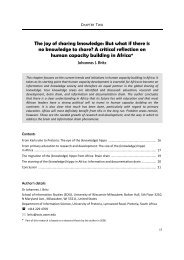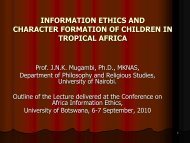Ethical Dimensions of the <strong>Information</strong> Scoiety: Implications for <strong>Africa</strong>on Facebook stays on Facebook, regardless of your privacy sett<strong>in</strong>gs and delet<strong>in</strong>g your account isimpossible, chang<strong>in</strong>g the privacy sett<strong>in</strong>gs to make your Facebook account more private is a delusion[...]” (Arico, 2011).The issue of breach of privacy <strong>in</strong> onl<strong>in</strong>e environments seems pervasive. Daily Nation (2012)carried an article say<strong>in</strong>g that companies that make many of the most popular Smartphoneapplications for Apple and Android devices rout<strong>in</strong>ely gathered the <strong>in</strong>formation <strong>in</strong> personal addressbooks on the phone and, <strong>in</strong> some cases, stored it on their own computers and then transmitted itwithout the knowledge of the owners of such <strong>in</strong>formation. Facebook, Twitter, Foursquare, Instagramand others were reported to upload either users’ contact phone numbers or e-mail addresses to theirservers for match<strong>in</strong>g purposes. These applications often perform this action without seek<strong>in</strong>gpermission or <strong>in</strong>form<strong>in</strong>g the owner how long they plan to store this data. In 2012, the Path iPhone Appusers were surprised to learn that the address books contacts of their e-mail addresses and phonenumbers had been uploaded to and stored on Path’s servers. Moreover, Google announced plans toreview its privacy policy that would legitimize releas<strong>in</strong>g <strong>in</strong>formation of its clients to third parties withouttheir [clients’] consent (Google, 2012).Currently, <strong>Africa</strong> has the fastest mobile phone growth rate <strong>in</strong> the world and there is also aproliferation of social media users. However, the <strong>in</strong>stitutional capacity for <strong>Africa</strong>n governments toguarantee citizens’ legitimate rights relat<strong>in</strong>g to ethics and morality <strong>in</strong> their <strong>in</strong>teractions with othersus<strong>in</strong>g new and emerg<strong>in</strong>g technologies, such as social media, seems neither to exist nor is itprioritised. Mason (1986) raises several ethical issues <strong>in</strong> the electronic age, which <strong>in</strong>clude privacy;accuracy; accountability for errors <strong>in</strong> <strong>in</strong>formation; how the <strong>in</strong>jured party can be made whole;<strong>in</strong>tellectual property; ownership of the channels through which <strong>in</strong>formation is transmitted; andaccessibility. New <strong>in</strong>formation technologies, such as social media, largely rely on the trust of the usersfor compliance with the provisions of the user policy. Trust is a critical dimension of ethics with an<strong>in</strong>terdiscipl<strong>in</strong>ary orig<strong>in</strong>, <strong>in</strong>clud<strong>in</strong>g (but not limited to) management (Dirks & Ferr<strong>in</strong>, 2002) and<strong>in</strong>formation systems (Salo & Karjaluoto, 2007; Lee, 2005 and Shao, Ma & Meng, 2005). Easton(1965) expla<strong>in</strong>s that the presence of trust means that members will feel their own <strong>in</strong>terests would beattended to even if the authorities were under little supervision or scrut<strong>in</strong>y. Besides, the ability to trustothers and susta<strong>in</strong> cooperative relations is the product of social experiences and socialisation.3. Social media penetration and uptakeThe social media deserve special attention <strong>in</strong> the <strong>Information</strong> Society for two ma<strong>in</strong> reasons: 1) the useof social media is the fastest grow<strong>in</strong>g onl<strong>in</strong>e activity worldwide; 2) it has had the most significantimpact, <strong>in</strong> the shortest possible time, among people of diverse professions, ages and genders. Weiss(2008) observes that the social media are a global phenomenon happen<strong>in</strong>g <strong>in</strong> all markets, regardlessof wider economic, social and cultural development. The growth areas of the social media, the worldover, are <strong>in</strong> video clips (83%); social networks (57%) and the widget economy (23%) (social networkusers with <strong>in</strong>stalled applications); and the blogg<strong>in</strong>g community (42 milion bloggers) (Smith, 2011).With regard to <strong>in</strong>dividual social network usage, Facebook was, <strong>in</strong> 2011, rated as the most popularsocial network<strong>in</strong>g space with an estimated 55 0750 million unique monthly visitors (eBizMBA, 2011;Arico, 2011). Moreover, the largest demographic group on Facebook was the age group 35 to 54,followed by the 18 to 24-year-olds (Y & Z generation respectively) (Corbet, 2010).In South <strong>Africa</strong>, MXit and Facebook <strong>in</strong> 2011 led the way <strong>in</strong> user numbers, followed by Twitterand BlackBerry Messenger. A social media 2011 survey found that there were about 3.4 million usersonl<strong>in</strong>e us<strong>in</strong>g Facebook <strong>in</strong> South <strong>Africa</strong>. This number translates to 64% of the onl<strong>in</strong>e populationFacebook users <strong>in</strong> South <strong>Africa</strong> (Socialmedia blog, 2012). Onyango (2012), cit<strong>in</strong>g results from asurvey of Twitter users <strong>in</strong> <strong>Africa</strong>, found that Kenyans are the second highest users of Twitter <strong>in</strong> <strong>Africa</strong>,Page 31
S.M. Mutulasurpass<strong>in</strong>g countries <strong>in</strong> the Maghreb that had used the facility to stage political revolt. Kenyans wereranked beh<strong>in</strong>d South <strong>Africa</strong>ns, but tweeted more than Nigerians, Egyptians and Morrocans, despitehav<strong>in</strong>g a lesser population. The survey found that 60% of those who tweet are aged between 20 and29 years. The study also found that 57% of these tweets are from mobile devices and are driv<strong>in</strong>g thegrowth of social media <strong>in</strong> <strong>Africa</strong>.Social media activity that started on <strong>in</strong>tranets and private networks has s<strong>in</strong>ce evolved tobecome a web-based social network<strong>in</strong>g tool. The social media platforms are proliferat<strong>in</strong>g and <strong>in</strong>clude,among others, MySpace, Twitter, Skype, L<strong>in</strong>kedIn, Google+ and Facebook. Social media are used for<strong>in</strong>teraction, enabl<strong>in</strong>g users to add friends, comment on profiles, jo<strong>in</strong> groups and have discussions.Photo and video support<strong>in</strong>g social networks <strong>in</strong>clude, among others, YouTube and Flickr. They enableusers to share and comment on other users’ submissions. On the other hand, Wikis, such asWikipedia, support social <strong>in</strong>teractions by enabl<strong>in</strong>g users to add and edit exist<strong>in</strong>g articles. Most socialmedia service providers are based <strong>in</strong> Europe and North America and are subject to the legalframework of those jurisdictions with regard to the legitimate rights of users.Lundsay (2010) observes that though the social media are relatively new compared to cellphones, us<strong>in</strong>g social media is now the number one onl<strong>in</strong>e activity, with its use account<strong>in</strong>g for 10% ofall users’ time on the Internet. In addition, social media use is grow<strong>in</strong>g three times faster than theInternet’s overall growth rate. The factors driv<strong>in</strong>g social media proliferation need not be overemphasised. Expectations and user onl<strong>in</strong>e behaviour is rapidly chang<strong>in</strong>g, with people exist<strong>in</strong>g <strong>in</strong> theworld of <strong>in</strong>stant, real-time communication, where immediate access to partners, customers and<strong>in</strong>formation is now the norm. Mathen (2012) observes that today’s employees create and receive<strong>in</strong>formation from a host of different sources and formats that cannot be met by typical corporate<strong>in</strong>tranets. Furthermore, s<strong>in</strong>ce organisations house the data people require, their network capabilitiesfall short of support<strong>in</strong>g new work environments and work<strong>in</strong>g styles. Besides, with globalisation,employees now rout<strong>in</strong>ely work with people outside their territories and different bus<strong>in</strong>ess units.The rapid penetration and use of the social media is also be<strong>in</strong>g driven by the rise of affordablehandsets and broadband connectivity. Farm<strong>in</strong>gton (2012) notes that the availability of cost-effectivemobile and wireless solutions and the greater demand for access to the social media platforms arebecom<strong>in</strong>g the most important factors driv<strong>in</strong>g the rapid growth of the media. Chauke (2012) supportsthis assertion by argu<strong>in</strong>g that more people are now connected to the Internet through their cell phonesthan through computers. Gosier (2008) notes that mobile phone penetration is higher <strong>in</strong> <strong>Africa</strong> than <strong>in</strong>any other region <strong>in</strong> the world, provid<strong>in</strong>g an enhanced environment for the growth of social media.Mathen (2012), cit<strong>in</strong>g a social media report from Portland Communications (USA), notes that <strong>Africa</strong>has 48 million social media users distributed as follows: 30 million on Facebook, 6 million on L<strong>in</strong>kedInand 12 million on Twitter. Moreover, <strong>in</strong> 2011, the number of Facebook users <strong>in</strong> <strong>Africa</strong> exceeded theuse of this medium <strong>in</strong> Eastern Europe and, for this reason, Facebook enabled a Swahili languageversion, while Hausa and Zulu versions were <strong>in</strong> the review process (Viralblog.com, 2009).The impressive growth of social media <strong>in</strong> <strong>Africa</strong>, compared to the broadband and e-Government <strong>in</strong>novations, is evident <strong>in</strong> the relative positions of the South <strong>Africa</strong>n DevelopmentCommunity (SADC) <strong>in</strong> the world rank<strong>in</strong>g, which show that South <strong>Africa</strong>, which is ranked 23 rd <strong>in</strong> socialmedia global penetration, was ranked 91 st <strong>in</strong> the Digital Opportunity Index <strong>in</strong> 2006 and this positionhas not significantly changed. The Digital Opportunity Index (DOI) is used to measure and evaluatethe opportunity, <strong>in</strong>frastructure and utilisation of ICTs by government and its people. DOI monitorsrecent technologies such as broadband and mobile Internet access, the fall<strong>in</strong>g price of broadband,and <strong>in</strong>creas<strong>in</strong>g broadband speeds (World <strong>Information</strong> Society Report, 2006).S<strong>in</strong>ce the social media have evolved <strong>in</strong>to a global phenomenon, they have progressively beenadopted by people of all ages and persuasions. The fast acceptance of social media is, <strong>in</strong> part, fuelledby the fact that traditional collaborative technologies such as e-mail and telephone, which are largelytext and document-centric, have become <strong>in</strong>creas<strong>in</strong>gly less efficient to drive <strong>in</strong>novation and productivityPage 32
- Page 1 and 2: Information Ethics in Africa: Cross
- Page 4: Information Ethics in Africa:Cross-
- Page 7 and 8: Page ii
- Page 9 and 10: Page iv
- Page 11 and 12: About the AuthorsDennis N. Ocholla
- Page 13 and 14: J.J. Britzmeaning of the ethical co
- Page 15 and 16: J.J. Britzright is not only on the
- Page 17 and 18: J.J. BritzFreeman, C. & Louca, F. (
- Page 19 and 20: R. Capurroprotection should be acco
- Page 21 and 22: R. Capurroindustrial and military a
- Page 23 and 24: R. Capurrocommon world instead of m
- Page 25 and 26: R. Capurroterminology (Wiredu, 1995
- Page 27 and 28: R. CapurroICT in Africa includes al
- Page 29 and 30: R. CapurroBuchmann, J. (Ed.) (2012)
- Page 31 and 32: R. CapurroRoosevelt, E. (1958). In
- Page 33 and 34: D.N. Ochollatheoretical views on th
- Page 35 and 36: D.N. Ochollaof GDP per capita are (
- Page 37 and 38: D.N. Ochollaassociate IK with tradi
- Page 39 and 40: D.N. Ochollafulfil the ideals as sp
- Page 41: S.M. MutulaBy definition, Informati
- Page 45 and 46: S.M. MutulaThe University of Manito
- Page 47 and 48: S.M. Mutula8. Gaps in social media
- Page 49 and 50: S.M. Mutulaadhering to policies and
- Page 51 and 52: S.M. MutulaIt was found that cultur
- Page 53 and 54: S.M. MutulaVelasquez, M., Andre, C.
- Page 55 and 56: D. KawooyaLikewise, the laws and re
- Page 57 and 58: D. Kawooya107) but slowly making it
- Page 59 and 60: D. Kawooya4. IP in Africa and ethic
- Page 61 and 62: D. Kawooyawrongdoing because of the
- Page 63 and 64: D. Kawooyapractices. Countries that
- Page 65 and 66: D. KawooyaOf course, at the core of
- Page 67 and 68: D. Kawooyanumber of information acc
- Page 69 and 70: Page 58
- Page 71 and 72: S.M. Mutulaparties and civil societ
- Page 73 and 74: S.M. Mutulaadoption of the principl
- Page 75 and 76: S.M. Mutulaset of 17 barriers for e
- Page 77 and 78: S.M. Mutulaavailing tender document
- Page 79 and 80: S.M. MutulaReferencesAkther, M.S.,
- Page 81 and 82: Page 70
- Page 83 and 84: J.J. Britzalso to benefit from it t
- Page 85 and 86: J.J. Britzthe public sphere, which
- Page 87 and 88: J.J. Britzinfrastructure, developme
- Page 89 and 90: J.J. Britz6.2. Qualitative indicato
- Page 91 and 92: J.J. BritzSen, A. (1993). Capabilit
- Page 93 and 94:
IndexCapurro 1, 3, 4, 7, 11, 12, 21
- Page 95 and 96:
IndexFFacebook 30, 33fairness 2femi
- Page 97 and 98:
IndexITU World Telecommunication 27
- Page 99 and 100:
Indexrecognition algorithms 11recon
- Page 101:
IndexYYoruba 49YouTube 30ZZimbabwe






